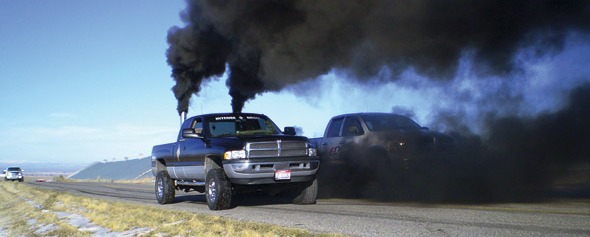Issues with diesel particulate filters seem to be popping up in message boards and in the press with an increasing frequency. DPFs have certainly have done a lot to clean up diesel’s act but it’s turned into a rather costly affair for many motorists.
Yesterday someone asked me: “Why there are so many “perceived” issues with Diesel Particulate filter and what car manufactures were doing about them?”. Here’s our take on the situation.
I for one am rather unimpressed and frustrated with the whole affair. I do around 16k miles a year which includes quite a lot of motorway miles at usual motorway speeds (60 – 70MPH). With that in mind, should I really be having DPF issues with such regularity? If you take a look at the vast number of other owners on the owners club forums, you’ll see that I’m certainly not alone in my struggle. In fact since I’ve owned the car (2008 Nissan Qashqai 2.0dci 2WD) its been dealer “forced” regenerated twice and I’ve had to do no less than three “DPF burn” runs, all since owning the car for less than 2 years.
If you take Nissan as our prime example, there’s been quite a lot of development on their side to help reduce issues and the bad press that’s accompanied it.
These changes / improvements include:
- Moving the DPF closer to the engine
- Introducing a 5th injector
Both of these steps have been taken to increase the heat at which the DPF operates, making the DPF burns much easier to achieve under normal driving conditions.
For those doing short runs and a lot of urban driving, this small but significant change could go a long way to alleviate the issues but due to the nature of their driving habits, it might not be quite enough.
I give credit to the likes of Nissan who seem to be doing something about the issue but I personally think they are going about it in the wrong way. The theory behind the changes seem logical and a step in the right direction, however have Nissan admitted that there was a design fault with the older cars?… not when they can take £300 for a “forced regeneration”.
Times are changing and new car buyers are more focused on fuel efficiency than ever. Manufacturers would be crazy not to market diesel cars with headline MPG figures, appealing to a would be customers wallet. However they should also take into account buyers driving habits and advise them accordingly. Will someone who does very few city miles a year really benefit from owning a diesel and the extra price tag that comes with it? Will they really see a significant saving from owning one?
Car dealers should be responsible enough to ask these types of questions but ultimately the final decision lays with the buyer. Many people just aren’t clued up enough to make an informed and educated decision when its comes to selecting a diesel or petrol car. The pull of 60+ MPG and cheap tax is often enough to blind many of the issues and risks associated with diesel car ownership.
With EU laws and regulations ever tightening, car manufactures are doing everything they can to play both the emissions game and also offer good value to their customers. Maybe it’s time that a little more emphasis was put on improving engine design and efficiency rather than slap more technology onto these aging engines. We also wonder how long it will take battery and clean burning petrol technology to fully mature, rendering the archaic diesel engine redundant.
We’d love to hear your thoughts and experiences on the matter so please feel free to leave a comment below or get in touch via twitter, facebook or Google+
If you are looking for more information on diesel particulate filters / DPF then check out our diesel particulate filter FAQ.
[ad]






Completely sympathize with you mate.
I own a toyota Avensis 2.2 T180 and do 25000 miles per yr of which at least 23000 are motorway miles. I have during summer months not too bad but after this, have issues with massive smokey regeneration’s, limp mode resolved by getting new turbo, poor fuel economy, major turbo lag unless i regularly clean EGR valve.
MY NEXT CAR WILL BE A PETROL CARD. DP F’s ARE GOOD IDEA BUT BASICALLY GARBAGE! Seems like at lot more needs to b done to make truly worthwhile.
Hi. I have a qashqai 1.5 dci 2017 moedel. Before buying the car i had no clue on dpf and how it works and the dealer never said a thing about it. I do highway driving every second week if not weekly as i work far from home. But i still get dpf blocking every now and then. Had to do first forced regen when the car was only 5 days from new, and i have done it 4 times in less than two years. It is frustrating to the extent that i hate the qashqai, not to mention the dealer who sold the car to me. I don’t see any professionalism on how they conduct business, especially on this matter. I was never given the right information for me to make my decision when buying. Those who still wish to own a qashqai diesel car; stay away, it’s a crap car. If you already own one, the best solution is to get rid of it, you will never get anywhere with it. Unfortunately for me i am stuck with it and has turned my life to misery
I have owned a Volkswagen Tiguan 2ltr Diesel since 2016 2nd hand, that had 96000 miles on it. I had no problems with it regarding the DPF until after the local VW Garage adjusted the ECU regarding the emissions. When it is due to regen, it starts issuing Blue smoke when the revs are above 1500 in the lower gears, I can control the smoke by keeping the revs below 1500. when this happens I go for a roundabout trip on a motorway near me, and the regen is over and the car then returns to normal, ie. No smoke until the next time. the other warning I get is the revs on idle increase from 800 to a 1000. what I am curious to know is why should I be getting the blue smoke at all, only when regen is due.? the Car now has 134500 now on it and still performs as well as before. only the smoking is causing me concern, anyone else like that